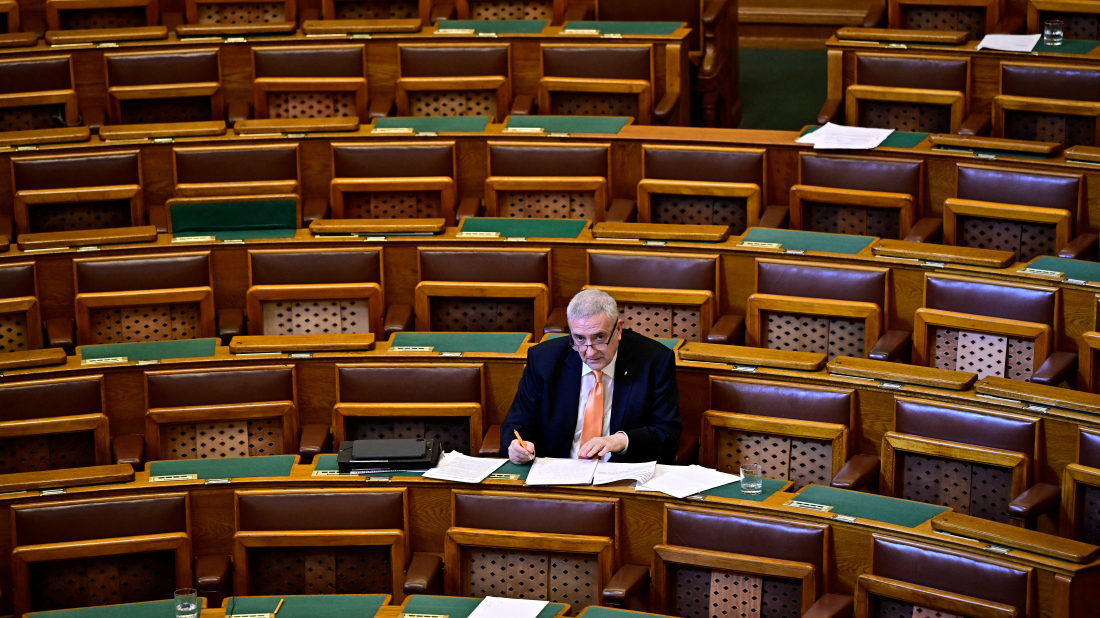What we know about Trump's Board of Peace
U.S. President Donald Trump’s 'Board of Peace' will hold its first leaders’ meeting on Thursday (19 February) in Washington, D.C., launching an in...

The ruling Fidesz party has delayed debate and voting on a controversial bill that would impose strict controls on NGOs and media receiving foreign funding, citing internal party discussions and external pressure.
Hungary’s ruling Fidesz party has postponed a parliamentary debate and vote on a controversial bill that would impose strict oversight on foreign-funded NGOs and media organisations deemed a threat to national sovereignty.
The proposed legislation, titled “Transparency in Public Life,” was introduced last month by a Fidesz lawmaker. If passed, it would grant the government sweeping powers to monitor, restrict, penalise, and potentially ban entities receiving foreign support that are perceived to undermine Hungary’s sovereignty.
The bill has drawn sharp criticism from civil society groups, legal experts, and international institutions. The European Commission and the Council of Europe have both urged the Hungarian government to withdraw the draft law. Critics argue that the proposal bears striking resemblance to Russia’s “foreign agent” law and would severely limit press freedom and civil society’s ability to operate independently.
Originally scheduled for a parliamentary vote in mid-June, the bill’s progression has been halted. Máté Kocsis, Fidesz’s parliamentary leader, confirmed that the party has postponed the debate, citing ongoing internal discussions about the appropriate “legal instruments” to protect sovereignty. He also noted that numerous amendments and proposals have been submitted by professional organisations, including the Hungarian Banking Association, the Hungarian Bar Association, and the Hungarian Association of Newspaper Publishers.
“No decision will be made on the matter before the summer. Parliament will not vote on it,” Kocsis stated.
This legislative effort follows the 2023 launch of Hungary’s Sovereignty Protection Office, an authority created to investigate organisations and media outlets accused of serving foreign interests.
Prime Minister Viktor Orbán, facing what polls indicate may be his toughest re-election campaign next year, has claimed that foreign actors — particularly from the United States and Ukraine — are attempting to manipulate public opinion in Hungary via independent media and anti-corruption NGOs. These organisations have rejected such allegations, asserting their work is nonpartisan and in the public interest.
The bill defines threats to sovereignty in broad terms. Groups may be targeted for allegedly undermining values such as Hungary’s democratic character, national unity, traditional family structures, or Christian heritage — raising concerns that even legitimate criticism of government policy could be framed as a national security issue.
The drumbeats have finally faded at the Marquês de Sapucaí, bringing the competitive phase of the Rio Carnival 2026 to a dazzling close. Over two marathon nights of spectacle, the twelve elite schools of the "Special Group" transformed the Sambadrome into a riot of colour.
Peru’s Congress has voted to censure and remove José Enrique Jeri Ore from his posts as President of Congress and acting President of the Republic, just four months into his tenure, citing undisclosed meetings with Chinese businessmen and alleged hiring irregularities.
Start your day informed with AnewZ Morning Brief: here are the top news stories for the 17th of February, covering the latest developments you need to know.
France celebrated Olympic gold in the men’s biathlon relay in Anterselva on Tuesday (17 February), following a thrilling race marked by an electric atmosphere at the stadium.
Qarabağ FK are facing Newcastle United in the UEFA Champions League play-off round on Wednesday evening in Baku, in what will be the first UEFA competition meeting between the two clubs.
Meta CEO Mark Zuckerberg was pressed for answers in a Los Angeles courtroom as a youth social media addiction case probed how far Meta went in shaping young users’ behaviour on Wednesday.
U.S. President Donald Trump on Wednesday sought to highlight his outreach to Black Americans during a White House reception marking Black History Month, held months before November’s midterm elections.
Hungary has suspended diesel fuel deliveries to Ukraine with immediate effect and will not resume shipments until crude oil transit via the Druzhba pipeline is restored, said Peter Szijjarto, Hungarian Minister of Foreign Affairs and Trade.
A platoon of Swedish Air Force Rangers is training in Greenland as part of the ongoing “Arctic Endurance” exercise, according to Sweden’s military.
U.S.-mediated talks between Russia and Ukraine in Geneva ended after two days of negotiations that Ukrainian President Volodymyr Zelenskyy described as difficult, while signalling progress on the military track.
You can download the AnewZ application from Play Store and the App Store.

What is your opinion on this topic?
Leave the first comment